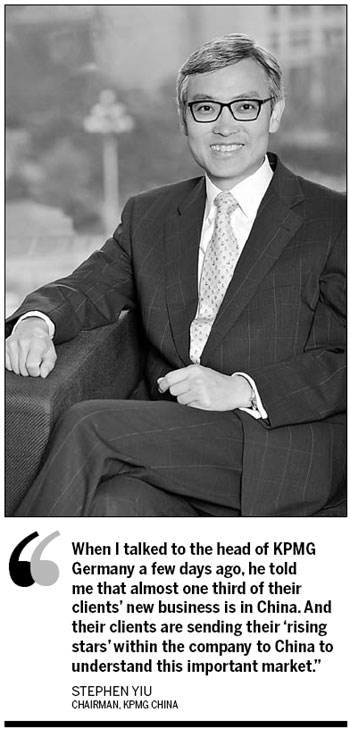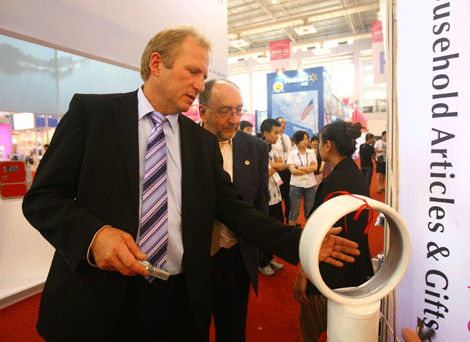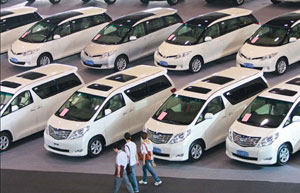Helping find new markets
Updated: 2011-12-15 07:55
By Hu Yuanyuan (China Daily)
|
|||||||||
|
|
KPMG veteran sets out strategy as 'Big Four' embark on hiring boom
BEIJING - Stephen Yiu, chairman of KPMG China, has been with the firm for 28 years. It is the first and only company he has worked for since graduating from Hong Kong Polytechnic.
After taking a variety of roles within the business, such as partner in charge of audit in China, senior partner of northern China, deputy chairman of KPMG China, Yiu took up his new post as head of KPMG China in April.
The priority of KPMG's China strategy, according to Yiu, is to help Chinese enterprises to go abroad and support international companies in coming to China.
"The Asia-Pacific region, especially China, will be the area offering great potential for us," Yiu said.
KPMG set up its international chairman's office in Hong Kong in October, showing its commitment to the Asia-Pacific area.
It is the first accounting firm among the "Big Four" to move its chairmanship into this region. It is also the first time that KPMG has named a partner - Michael Andrew - from the Asia-Pacific region to lead the firm globally.
Currently, around 20 percent of KPMG's revenue comes from the Asia-Pacific region, with the remaining 80 percent coming from the Americas and Europe, Middle East and Africa, indicating there is more room for growth from the Asia-Pacific area.
"We launched the Global China Practice to support Chinese enterprises looking to expand abroad," said Yiu.
So far, KPMG has unveiled the Local China Practice - a team consisting of Chinese staff - in more than 40 countries, which is aimed to better serve Chinese enterprises going overseas.
Two decades ago, KPMG established a similar Global Japan Practice to shore up Japanese companies' overseas expansion. It was a great success.
"When I talked to the head of KPMG Germany a few days ago, he told me that almost one third of their clients' new business is in China. And their clients are sending their 'rising stars' within the company to China to understand this important market," Yiu said.
Business focus
In terms of business, the three major areas the firm will focus on in the coming five years are audit, tax and advisory, according to Yiu.
Currently, audit and tax account for around 70 percent of KPMG's business, but advisory, as a rapidly growing unit, saw double-digit growth annually in recent years.
"We are expecting to see soaring revenue from our advisory services, such as consulting for M&A (mergers and acquisitions), outsourcing, cost minimizations and business transformation," Yiu said.
Both globally and in China, KPMG plans to concentrate on three major industry sectors: financial services, healthcare and infrastructure.
For audit, a major business for KPMG, Yiu said the company will pay more attention to small and medium-sized enterprises (SMEs), especially the private ones.
"Chinese SMEs cannot borrow enough money from banks to finance their operations, suggesting they get financed through listings on the (domestic) A-share market, growth enterprise board (ChiNext) or overseas stock markets in Hong Kong, Singapore, Australia and the UK," Said Yiu.
Furthermore, KPMG will help foreign companies enter the domestic market, particularly companies eyeing a listing on China's imminent international board.
According to Yiu, there are at least five global companies from various industries that KPMG is working on for a listing in China. As China has its= own legal, accounting, taxation and auditing systems requirements for listed overseas companies, they need to know about these differences.
"The fundamental preparation for their listing is likely almost ready. As soon as the government offers the green light, one of the five companies could achieve a listing within six months," said Yiu.
However, he said more coordination is needed between various regulators.
"The business in this field, however, won't add much to the growth of our business volume, as most of these companies are existing clients," he said.
"How much business the international board contributes to growth in KPMG's business volume depends on how open China is to foreign capital."
Talent as a challenge
Like many other companies, Yiu cited "talent" as one of the major challenges facing KPMG.
He said that different requirements have been proposed for hiring for different jobs, citing "experience" needed for advisory. "For each job, professionals are needed," Yiu added.
"It is difficult to find experienced staff, especially those who can head our emerging business," said Yiu. "So, we have to seek such talent globally."
Meanwhile, although there are thousands of new graduates in China each year, finding an appropriate talent pool is also no easy job.
According to Yiu, people who are committed to the profession and also enjoy it are the ideal candidates.
"Since we remain attractive in terms of remuneration and career development, it's not difficult to find new employees. But the most important thing is whether the person we recruited is willing to enter this field and spend time in the profession," Yiu said.
Besides seeking the right person for the right job, rapidly rising labor costs in China are another concern.
"The wage gap between the Chinese mainland and Hong Kong has largely shrunk in the past few years," Yiu said.
Although a number of international banks have recently announced plans to cut jobs globally, in preparation for future economic uncertainties, Yiu said the firm will recruit more staff this year in China.
To fuel its rapid expansion and support its double-digit growth in China, KPMG plans to recruit up to 1,700 to 2,000 new graduates in the country this year, compared with 1,500 last year.
"With stable growth, China is the priority in our five-year strategic development, driving us to invest hugely in human resources," Yiu said.
Yiu admitted that accountancy in China needs to develop its own value, culture, quality and professionalism, which is important for the development of the industry.
Balancing life
When asked if he has ever tired of the job and the firm, Yiu, who has been working with KPMG since 1983, thought for a while and said "No" firmly.
"I will find it boring only when there's no work to do," he said.
"In auditing, we have to finish tasks before a deadline. I often feel a sense of accomplishment when I finish a task in the limited timeframe."
To strike a balance between business and family, Yiu sometimes takes his wife along on business trips.
"Sometimes, she accompanies me to international conferences, usually about three times a year," Yiu said.
To channel his full effort into work, Yiu sent his children overseas to study.
"They have been studying abroad since the age of 12, coming back three times a year, while we go to see them a few times a year as well. Between me and my wife, we probably see our children at least six times a year and in fact have some good quality time with them," Yiu said.
In his spare time, Yiu loves playing golf and reading. However, with significantly less leisure time now, his golf skills will likely regress.
"When I played golf 14 years ago, I went to the golf course almost every weekend. Now, I visit barely once a month," Yiu said.
Chen Keyu contributed to this story.













